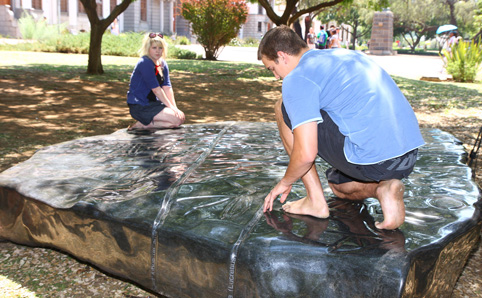Latest News Archive
Please select Category, Year, and then Month to display items
09 November 2018
|
Story Charlene Stanley
|
Photo Charlene Stanley
 Dr Tseliso Ntili, HOD of the Free State Department of Water and Sanitation, warns that pollution caused by mismanagement of municipal water-treatment works puts severe pressure on the province’s water security.
Dr Tseliso Ntili, HOD of the Free State Department of Water and Sanitation, warns that pollution caused by mismanagement of municipal water-treatment works puts severe pressure on the province’s water security.
“Despite our water challenges, Bloemfontein will never become a second Cape Town.” This firm assurance was given by Dr Tseliso Ntili, HOD of the Free State Department of Water and Sanitation, during his presentation at the recent regional seminar of the Faculty of Law’s Environmental Law Association.
The theme of the seminar was Water Quality and Water Security in Bloemfontein and was attended by staff and students from the Faculty of Law and the Faculty of Natural and Agricultural Sciences, as well as relevant role players from private, business, and government sectors.
Not enough water for city’s needs
Water restrictions in some form do seem to remain part of our future landscape though, as Dr Ntsili explained that the city’s current water yield of 218 megalitres per day still fell short of the demand of 259 megalitres per day.
Pollution and mismanagement at municipal level
He pointed out that a big cause for concern was that 75% of the Free State’s waste-water treatment works were dysfunctional. Housekeeping and security at these plants are often severely neglected. Yet, it is difficult for the Department of Water and Sanitation to act against offending municipalities.
“In intra-governmental disputes, the courts must be satisfied that organs of state have taken all reasonable steps to settle contentions – which can be a time-consuming process,” he explained.
Dr Ntsili said that the Caledon River System’s dwindling water levels due to low rainfall and siltation was also a concern, but that plans were underway to supplement the water supply to Bloemfontein via the Gariep Dam by 2026.
However, he warned that poor water management could drastically affect these long-term plans.
“If we can’t manage pollution, the cost will be high. Water security will be challenged, and we will have water shortages – not because of drought, but because of negligence.”
Willem Boshoff’s artwork placed on Bloemfontein Campus
2011-10-21
 |
Students viewing the new artwork on our Bloemfontein Campus
Photo: Hannes Pieterse |
There was great excitement last week when Willem Boshoff’s Thinking Stone sculpture arrived and was installed near our Main Building. The black granite stone, which was quarried at Boschpoort Granite in Belfast, Mpumalanga, weighs approximately 20 tons and took about a year to polish to give it its burnished quality.
On the surface of the stone are engravings that resemble the prehistoric rock engravings of the Driekopseiland rock art site close to Kimberley. Added to the engravings are sandblasted inscriptions in six languages of verses and well-known quotes that refer to the word “rock”.
Willem Boshoff is one of South African’s most established artists and his artworks are deeply involved in relationships and focused on bringing about conversation. Willem describes the Thinking Stone as being “a place for gathering and sharing ideas, as universities should be”. The sculpture is a huge investment for our university and will, for many years to come, inspire thought, dialogue and contemplation.
Willem Boshoff’s sculpture is, to date, the largest of fifteen artworks commissioned by the Sculpture-on-Campus Project and funded by the National Lottery Distribution Trust Fund.